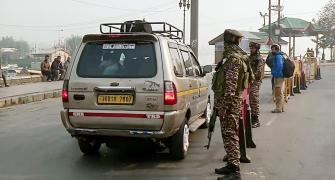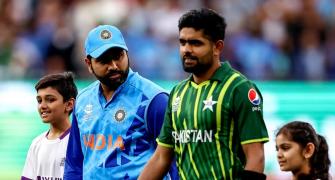 When Alan Johnson, associate professor of English in the Idaho State University in United States, goes to India on a Fulbright Scholarship to lecture and study at the University of Mumbai next year, it will be yet another emotional reunion with a country where he was born to American missionary parents.
When Alan Johnson, associate professor of English in the Idaho State University in United States, goes to India on a Fulbright Scholarship to lecture and study at the University of Mumbai next year, it will be yet another emotional reunion with a country where he was born to American missionary parents.
Though the six-month stint is primarily focussed on study and teaching, Johnson says it is the emotional undercurrent that makes it special.
"My stay in Mumbai will certainly be an emotional reconnection, as is every return visit," the scholar told rediff.com.
"I should say that I have visited India numerous times since my high school graduation, and have learned a lot about my birthplace each time. As with most bi-cultural people, I am always connected to the place in which I grew up, so that when I am here in the United States I always feel a bit displaced. That is why I bore my children with stories about my upbringing in a far-off land! There's certainly a danger (for anyone) in mythifying all of this, so my frequent visits have helped me re-focus my nostalgia."
Thanks to the prevalence of the Internet, the easy availability of Bollywood films and greater access to ingredients essential to Indian cooking, Johnson has been able to feed some of his nostalgic pangs.
"My wife is from Kanpur, so I am able to satisfy my taste for Indian khana (cuisine)," said the scholar, who is well versed in Hindi, and is an expert on postcolonial literature and theory with a focus on South Asian literature, primarily Indian.
Johnson studies Indian writers in English, who have become increasingly popular abroad as well as in India -- including Salman Rushdie, Kiran Desai and Amitav Ghosh -- and will during his stint in Mumbai, teach classes on globalisation and literature, literary theory, and postcolonial studies.
Johnson said he is thrilled by his selection, not only for the opportunities it allows for study but also for the opportunity to be an ambassador for Idaho State University in particular and American higher education in general.
It will be interesting, he said, to see how the University of Mumbai works, and to become familiar with Indian higher education -- knowledge that could, as the US tries to attract more international students, be useful when he returns to the US.
"It is not just the subjects I teach but the reciprocal relationships I wish to cultivate that are important," Johnson says.
Thanks to his earlier visits, Johnson has a sense of how India has been changing, both the good and the bad.
"On the plus side, I think mobile phones have empowered a lot of people, and in many states literacy, particularly among women, has made great strides, which improves everyone's lives," he said.
"It has also been fun to see the growing numbers of women, from a range of classes, going to work on scooters."
On the flip side, he lists the increase in traffic that, he says, makes him nervous when crossing the road.
Johnson's father first went to India in 1949 and his mother followed in 1951. Johnson said he hoped that his wife, a Kanpur native with a degree from California, and their three children can visit him during his stint in India.
The academic said he will not be imparting knowledge about his subject in the traditional sense. "Quite the contrary -- I aim to learn a lot from my Indian counterparts, and from Indian university students."
"I think it will be really profitable for me to share with my Indian colleagues a sense of how my institution operates, what the challenges are in the US for educational effectiveness, including the trend toward online instruction and privatisation, and how all this affects my particular discipline," he said.
"These days, with universities worldwide seeking to forge agreements, and with students travelling more and more, it seems particularly important to find areas of convergence," Johnson added.
He says his parents were good role models, as they believed in learning from the culture where one lives rather than assuming, as many Westerners did during the British period, that they had all the answers.
"They learned fluent Gujarati, and besides serving in various churches around India they were also involved in English education for less privileged individuals, in clinics among the poor, in orphanages, and in various kinds of relief efforts.
"So I grew up in different kinds of environments, among all kinds of people, and was naturally at home in all this. I went to an international boarding school in Kodaikanal in Tamil Nadu, from which I graduated. What I realised when I came to the United States for college and could gain some perspective was that India is an amazingly generous, diverse, and culturally rich place," Johnson, who has also lived in Uttar Pradesh, said.
Johnson, who has been at ISU for about a decade, said he still maintains contacts with many of his school friends from India, who are scattered across the globe.
"I have a great emotional attachment to India -- so much so that I married an Indian!" he said.
"I watch Bollywood films all the time, and even presented a paper on this recently. My recent scholarly research, which is soon to be a book, concerns colonial India, and I have now turned my gaze to more recent Indian writers. So my time in Mumbai will, I am sure, be a very productive one."








